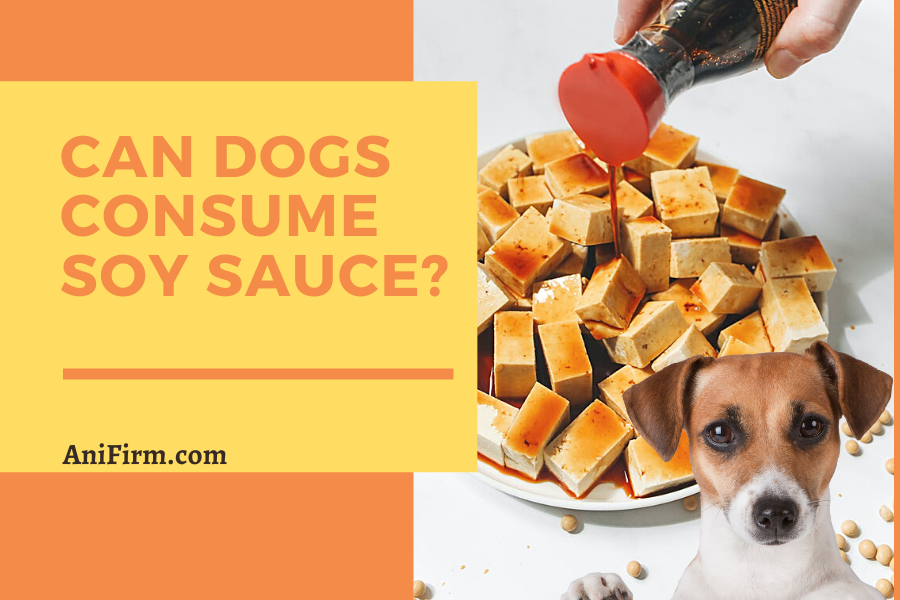Sauces are popular with kids. They want sauce or ketchup with every piece of junk food they eat. They eat a variety of sauces with their noodles, French fries, pasta, and pizza. Dogs are good friends for children, and children, like dogs, share everything with their friends. They enjoy giving them treats in order to get them to behave properly and express love. However, as a responsible dog owner, you should not give your dogs treats on a regular basis. Also, before you give him any treat, do extensive research on the treatment that you intend to give him. Soy sauce is one of many unsafe and unhealthy foods that humans enjoy but should avoid feeding to dogs. Because it also contains garlic and onion, soy sauce is high in sodium and can cause a variety of health problems in dogs, including heart disease, kidney failure, salt poisoning, and anemia.
Why Can’t Dogs Consume Soy Sauce?
Salt, onion, garlic, and other seasonings are among the ingredients in soy sauce. A high salt intake can result in salt poisoning or kidney failure. Other neurological problems can result from salt poisoning. Diarrhea, vomiting, thirst, urination, tremors, hyperactivity, and seizures are all signs of salt poisoning.
Salt poisoning will eventually lead to kidney failure in your dog, which is a serious and life-threatening problem. Dogs, too, have kidneys. They have kidneys to help balance their bodies’ nutrients and filter out waste. Kidney failure in dogs is usually caused by a urinary obstruction in the dog’s body. When blood flow decreases, the dog’s kidneys become less oxygenated and more vulnerable to infection. In this case, sodium causes excessive thirst and dehydration, which eventually leads to kidney failure as the kidney loses oxygen. Dehydration, decreased appetite, excessive thirst, loss of interest in interacting or playing, vomiting, diarrhea, blood in urine, pale gums, mouth ulcers, and stinky breath are all symptoms of kidney failure. Any delay in treatment may prove fatal to your dog. It may also result in the untimely death of your dog. Your dog may suffer from toxicity as well as salt poisoning or kidney failure because soy sauce contains onion and garlic. Both are toxic to dogs and can cause anemia, organ failure, heart damage, and even death if consumed in large quantities. Garlic and onion poisoning symptoms include vomiting, diarrhea, weakness, drooling, abdominal pain, loss of appetite, and so on.
What Happens If Your Dog Consumes Soy Sauce?
Do not be alarmed if your dog consumes soy sauce without your knowledge. It all depends on the dog’s size, age, weight, and breed to determine how much salt will have an effect or how long it will take to show a reaction. Your dog, on the other hand, will give you every warning sign possible before things get out of hand. It is your responsibility to thoroughly examine your dog and look for symptoms. Only one teaspoon of soy sauce is enough to cause problems for your dog.
If your dog consumes a large amount of soy sauce, you can only imagine the consequences. Make sure your dog drinks plenty of water because excess salt causes thirst and dehydration. Too much thirst equals too much water, and too much water equals too much urination, it’s that simple. As a result, you must transport him for defecation. Look for other signs of salt poisoning or kidney failure and contact your veterinarian, or call the pet poison helpline. Their services are available 24 hours a day, seven days a week, and they have better poisoning treatments. They can also teach you how to keep poisonous items away from your pet or provide you with a list of poisonous items to assist you further. Your veterinarian will administer the necessary treatment to your dog based on the severity and diagnosis. Medication, intravenous fluids, dialysis, a change in diet, and monitoring may all be part of it.
Conclusion
Soy sauce is unquestionably off-limits. Dogs are poisoned by the ingredients in soy sauce, which include salt, garlic, and onion. Salt poisoning, garlic, and onion poisoning, and kidney failure are all dangerous side effects that can worsen the situation and prevent your pet from living a long life. If your dog consumes soy sauce, look for the following symptoms: vomiting, diarrhea, weakness, drooling, abdominal pain, loss of appetite, excessive thirst, loss of interest in interacting or playing, blood in urine, pale gums, mouth ulcers, and stinky breath. If you notice any of these symptoms, contact your veterinarian right away. He will instruct you on how to relieve your dog and begin treatment in the case of kidney failure with medication and dialysis.
